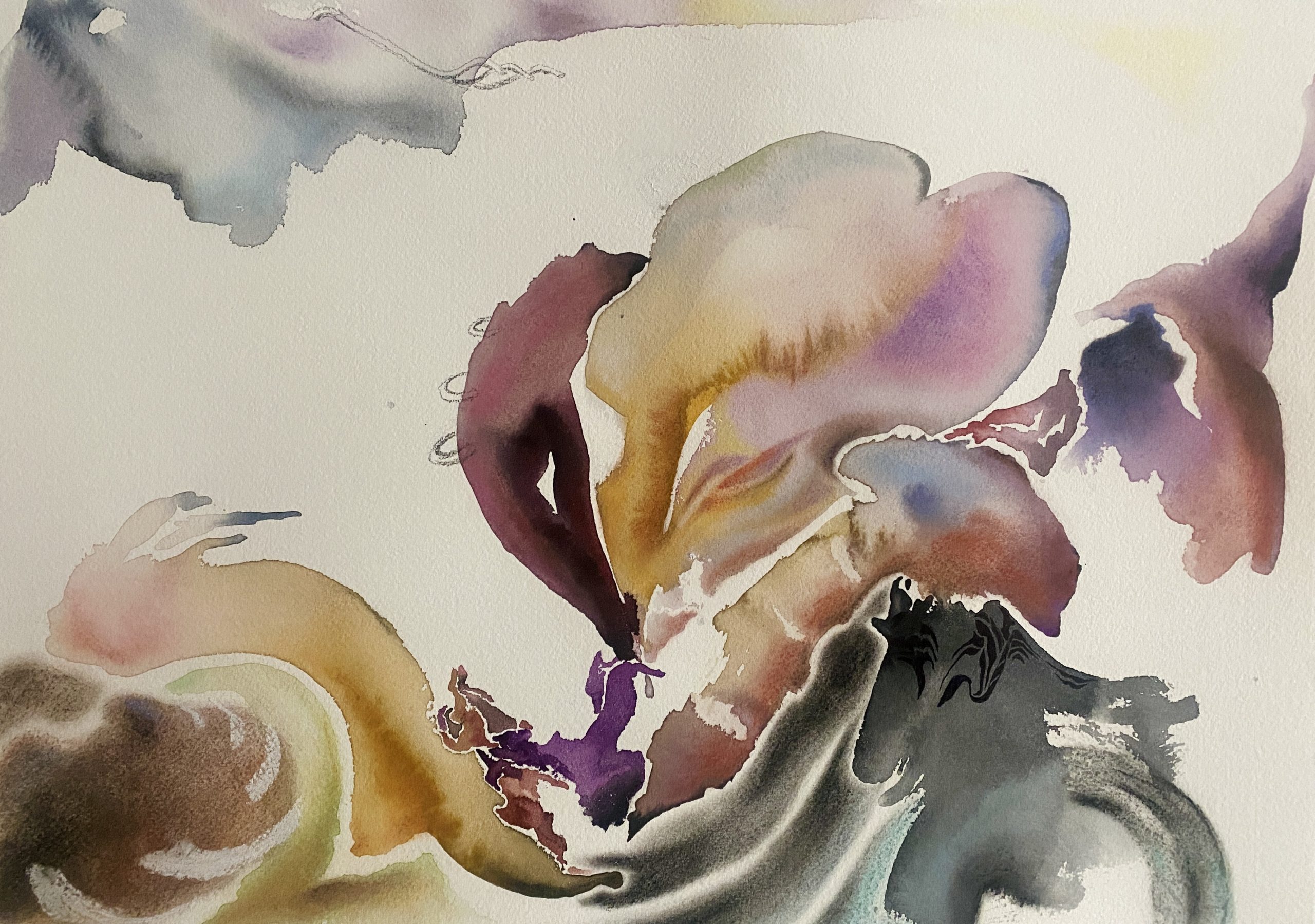Last Hurrah

art by Leah Huang
I am the bow, Eric the arrow. Kahlil Gibran’s The Prophet taught me this.
“Yes,” I said, when Eric’s teacher, Jack Wagner, sent an email asking for parents to help with a trip to Western Michigan University’s 2018 jazz invitational for high school musicians. Eric would play sax with his Community High combo, a devoted (sort of) group that included drum, bass, sax, piano, and electric guitar. Since Eric was my youngest son and a junior, my volunteer days were numbered, counting down to Eric’s launch into the larger world.
Eric had been playing instruments since third grade, starting with flute that made its way with him into fifth grade elementary band. “No doubt about it, Eric’s musical—both my sons are,” said choral-singing, piano-playing me. (Their dad doesn’t play an instrument and can’t carry a tune.)
Eric sang one year with Ann Arbor’s Boychoir, which started with an easy-going yet penetrating audition with the director.
“Can you sing this?” Dr. Strode asked, playing an arpeggio. “How about this”—a scale in a different key. Strode played several odd intervals on the piano, asking Eric to match the tones. He did.
The director paused. “So, Eric. Could you sing a D for me?” Eric the flute player grabbed a D out of the air and sang it. I looked down, beaming. That’s my boy.
I first read The Prophet in the seventies, in high school, when it surged in popularity a good fifty years after the book was first published. I read its spare, poetic prose—puzzled, pondering, and sometimes dazzled. Decades later I reconsidered its two pages on parenting, remembering—vaguely—I’d liked them the first time around.
Your children are not your children.
They are the sons and daughters of Life’s longing for itself.
They come through you, but not from you,
And though they are with you yet they belong not to you.
Boychoir didn’t stick—the repertoire challenging, too classical, and boring for a ten-year-old. Band did, though, with Eric staying with it through elementary to high school. It helped that Dave Gilbert had been his teacher since third grade. An aging jazz musician himself, Dave was knowledgeable and laid back. He felt the music stood for itself. Week after week I sat in Dave’s living room while Eric took his lesson, Dave’s hulking Doberman slobbering lavishly over my forearm.
Tiny Community, Ann Arbor’s hippie alternative high school, had no conventional band program. Instead, it had jazz. Boy, did it—Jack Wagner’s magnificent, Downbeat Magazine award-winning jazz program with large ensembles, small ensembles and many students.
Most kids came to it without any jazz experience—just the traditional middle-school bands they’d played in. Eric had Dave and some combo time with a local man who liked working with kids. Eric could read jazz music charts and improvise. In middle school he wanted to switch to sax.
“Not sax,” his school band teacher said. “That’s too hard. You start with clarinet, then move to sax.” And a jazz musician was made (not born. Some nurturing was necessary).
Jack was truly magical, coaxing a clueless group of twenty freshmen into big band land. They learned more music theory in one year than I’d gotten in twenty years of piano instruction.
“The Phrygian scale?” I asked. “Mixolydian?” I’d never once heard these terms. I played chords like a D half-diminished seventh because I saw the notes written on a music page, never knowing what they were called.
In Jazz I, II, III, there were theory tests. You had to know these things.
I loved every bit of it, vicariously, learning about a genre I knew nearly nothing about, listening to Eric and his fellow musicians get better and better. They learned—awkward and stodgy at first, then fluid, melodic, harmonic.
“I envy you,” I told Eric. “They would never teach classical piano students about this.”
Eric looked at me blankly. “Uh, too bad, I guess.”
Gibran told us,
For their souls dwell in the house of tomorrow, which you cannot visit, not even in your dreams.
You may strive to be like them but seek not to make them like you.
For life goes not backward nor tarries with yesterday.
As Eric progressed through the years and got better, joined smaller groups, became part of a combo, he became restless.
Jack pushed hard. “You’re a good sax player, Eric. You need to take private lessons.” Eric had stopped a couple years earlier when Dave’s Parkinson’s Disease left him unable to teach anymore.
The new sax teacher we found on Jack’s recommendation also specialized in jazz. Like Jack, he asked for a lot.
“You need to do these,” he said, laying out more exercises. “You slacked off last week, didn’t you?”
Eric lasted a year, then asked to quit. “I like just playing my sax,” he said. “I don’t want to work that hard on it. It’s just no fun anymore.”
And so he came to junior year’s Jazz III and his new combo, Tour de Force. Despite dropping the private lessons, he still played well.
“But you could be better,” Jack encouraged. Eric said nothing.
Later on, at home, Eric had his reply. “I don’t want to be better. I just want to have fun playing my sax.”
*
WMU’s annual jazz invitational fell on a Saturday in early February, a cool day lit by the sky’s muted watercolor blue and white. The festival brought high school groups from Michigan and Indiana for a full day of music competition. My job, as volunteer, was to drive Eric and several others two hours west to Kalamazoo. My other job was to take responsibility for a tiger bass, an elegant school-owned, brown-striped bass violin. I made sure it found its way from van to practice room to performance, and back again. Lucky for me, it had those distinctive streaks so I never confused it with the other basses lurking about.
When I wasn’t tracking the bass, I watched groups large and small play their songs. I sat, rapt, as keyboardists rippled over keys, trumpeters riffed, bassists thumped. I wanted to grab every moment, never let it go. Eric’s last year—no one else knew this, but I did.
I watched his quintet play, Eric totally absorbed in his notes, sax swaying to and fro. He’s having fun, by God, I could tell. So was everyone else, but my eyes were on him. Play, Eric. Love it while it lasts.
I’d forgotten how clearly The Prophet tells us that there’s an Archer whose grand plan directs me, the bow, and ultimately the arrows I send forth. My relationship with the Archer, tenuous in my early days, had largely evaporated as adulthood pushed on. Still, I felt some higher purpose, if not being, orchestrated my behavior. Whatever force it proved to be, I found it powerful.
My thoughts paraphrased Gibran’s words, interpreting correctly or not as I fit them to my own experience. I couldn’t take full responsibility for Eric’s musical future. The Archer would do that.
*
On my lunch break I left the venue entirely, to visit my alma mater just next door to WMU. For a Michigan February, the weather felt tolerable—forty degrees and partly sunny under clouds looking like stretched cotton batting.
Maybe it was a bad idea to drop in on Kalamazoo College so many years later. This looks the same. That doesn’t. With all its recent renovations, the student union building felt sophisticated, high energy, no doubt related to the first-floor coffee bar.
“I’m a K grad from ’79,” I said brightly to the barista.
“Oh, that’s nice,” she said politely. Just another ancient alum—that was me.
A tour of the lovely new Upjohn Library stirred similar feelings. Next I headed to the fine arts building where biology-major me spent countless hours practicing piano and harpsichord and playing in recitals. Fortunately, this building hadn’t seen much change over the years, blessedly familiar.
After the quiet of the quad on a February Saturday, the basement hall of practice rooms rang with musical humanity. Piano, voice, and French horn pierced through the cracks around practice room doors, transporting me back to my own years there.
Every day at five PM I walked to a reserved room, where my piano books sat undisturbed in a tall pile on a shelf. There’s an advantage to attending a small school—knowing you can stash your books in a practice room and no one will move or steal them.
I looked at the posted schedules and found a room with no student listed for that hour and stepped inside. Another advantage to a small campus—no locks on the doors. I sat down before an upright Yamaha and placed my hands on the keys. At age fifty-five I’d gone back to taking lessons to retrieve some of my technique and tried valiantly to remember more than a few bars of a piece I was working on.
A little Debussy? I started in on “Sunken Cathedral,” faltering after half a page. Definitely a little Debussy. But you’re sixty, I told myself. Your memory isn’t what it used to be.
My memory of the happiness I felt every five PM in 1979 was just fine, however. The recollection of playing harpsichord in our school’s Bach Festival with the nefarious sophomore clarinetist David Horowitz was clear and foul, too.
A daily descent into the basement practice rooms nourished me, distracted me from the harsh demands of biology, chemistry, physics.
*
More groups played, late into the afternoon. We moved to the large auditorium to see invited guests and the last big band play, followed by awards. I sat way in the back, planted on the floor with my back against a wall. Best big band, best combos, best … everything got a certificate.
And then came the awards for best individual artists.
“And the award for best individual sax performance…”
Eric Hughes.
I gasped. So, so unexpected (“Eric, you could do better.” “But I want to play for fun.”) But so, so right.
An hour at the keyboard still feeds me, sends me into a remote musical space where I forget the time, my mundane responsibilities.
I want this for my Eric.
When I saw him wailing on his sax on WMU’s recital hall stage, I understood that he does have this. Even though he wouldn’t continue in the school program anymore, he’d have music for the rest of his life. My arrow had found its mark.


